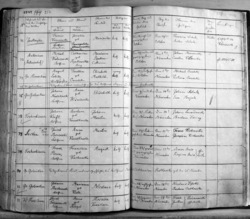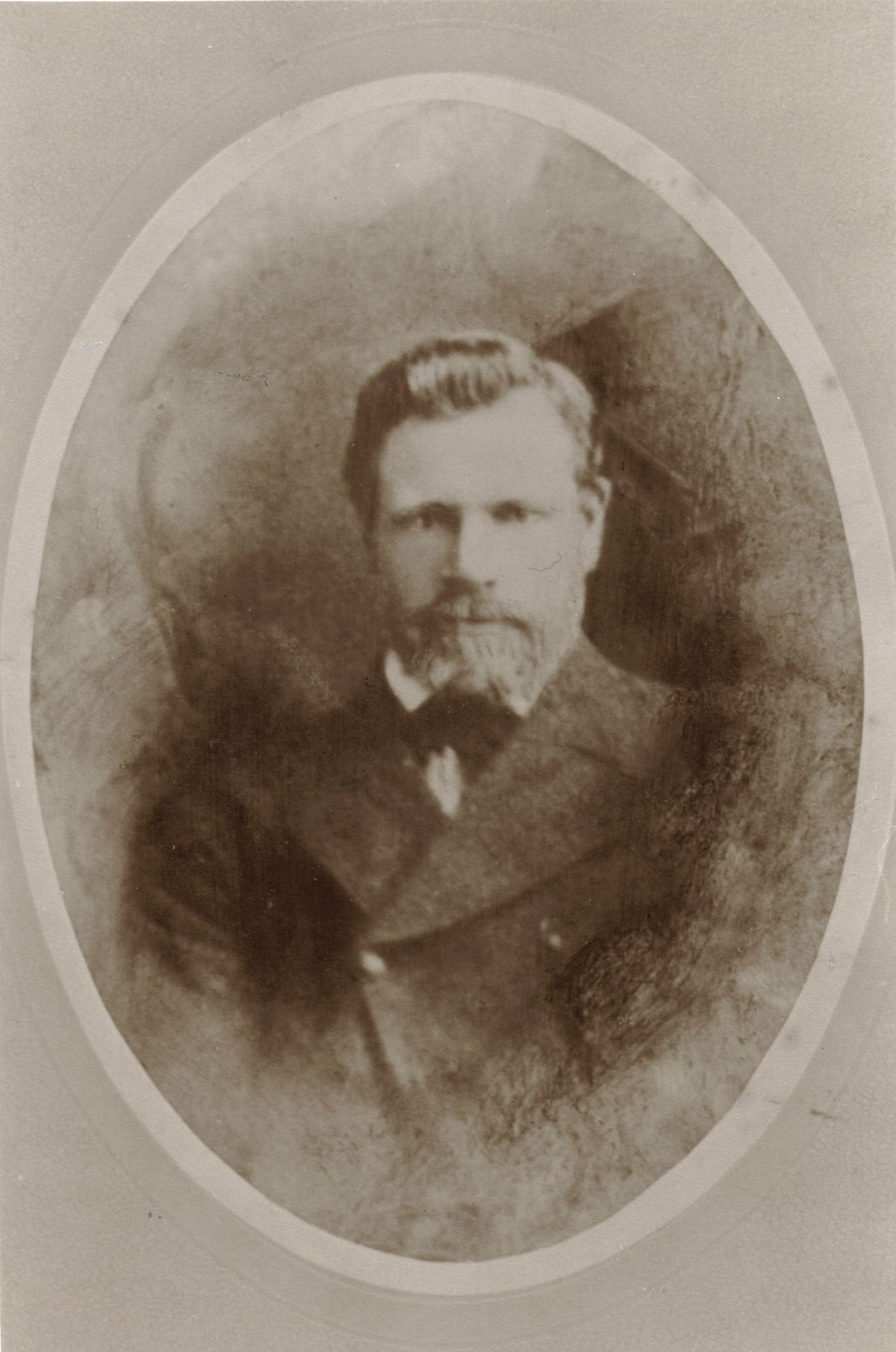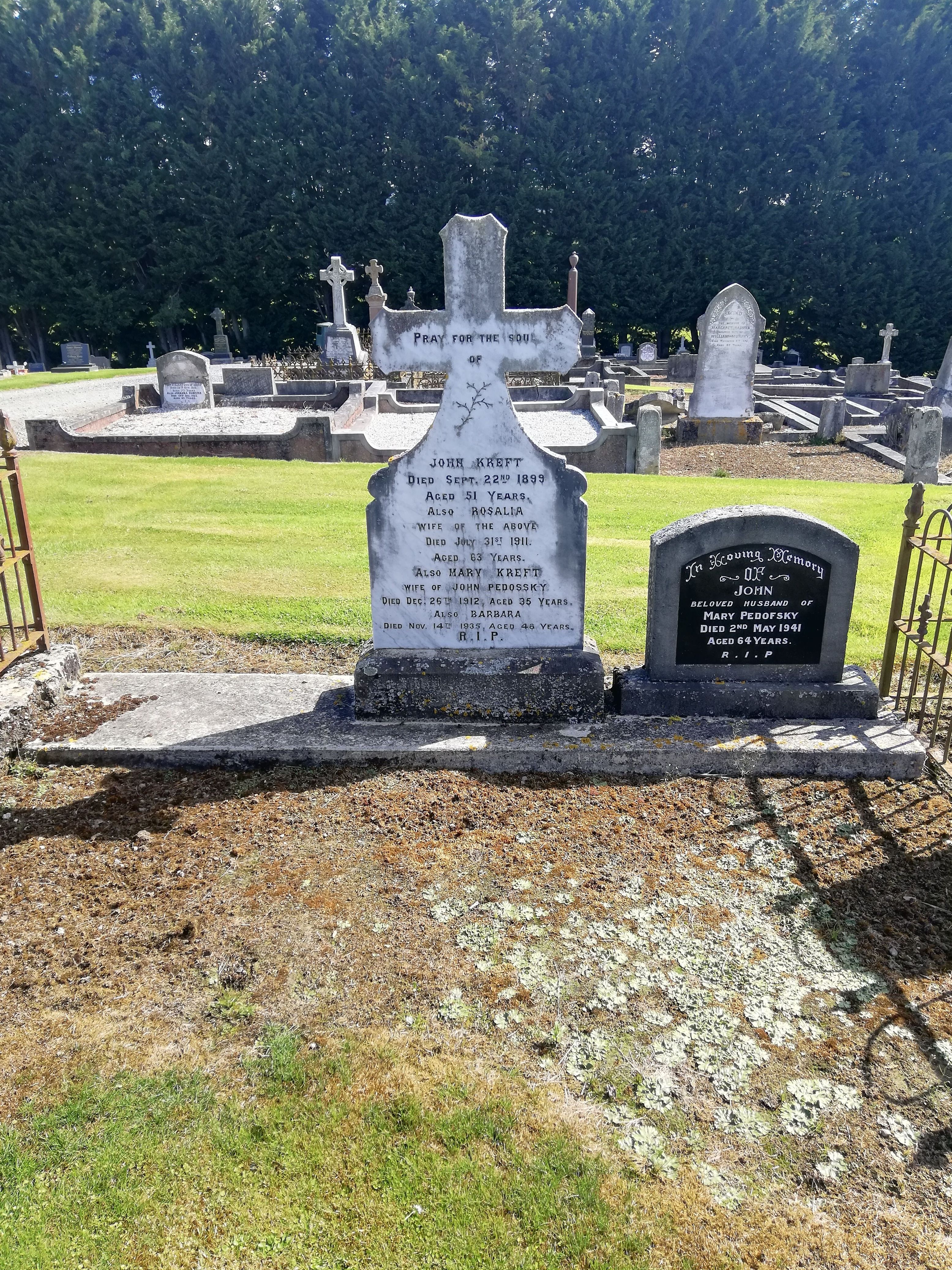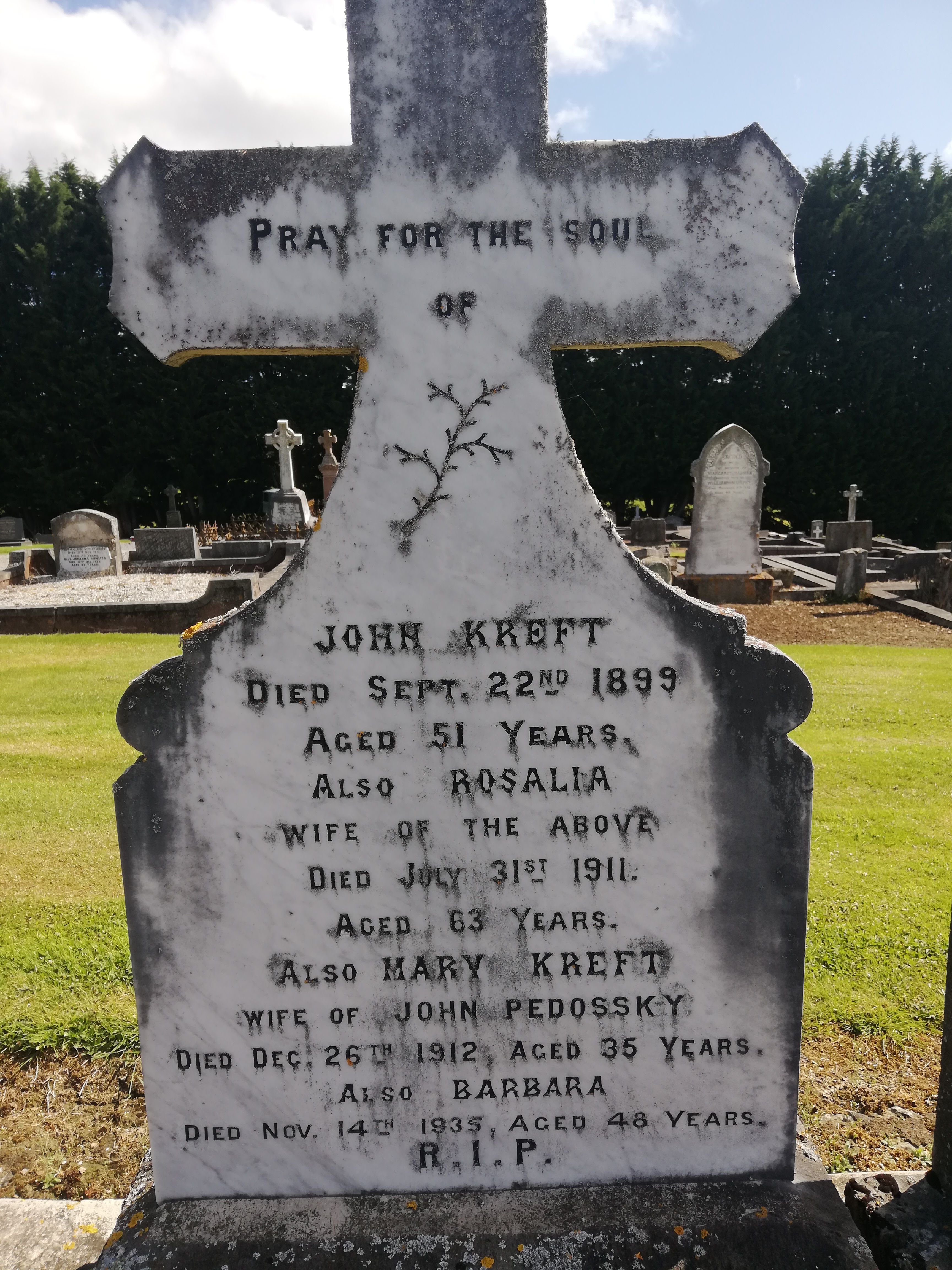Jan Marcin Kreft (b. 1847–d. 1899) was born at Szczerbęcin on 07 November 1847, the son of Jan Kreft (b. 1816–d. 1865) and Barbara Kowalska (b. abt. 1821–d. 1907). Jan married 15 November 1868 at St. Jan Nepomuncen in Godziszewo to Rozalia Chełkowska (b. 25 May 1848 at Turze Wielki–d. 1911), the daughter of Albrecht Chełkowski (b. 1810–d. 1875) and Katarzyna Stolc (b. 1810–d. 1881). The family born at Szczerbęcin were: Franciszek (b. 1869–d. 1869) and Jan (b. 1870–d. 1925), at Stanisławie; Jozef August (b. 1873–d. 1952). Rozalia had sisters, Weronika and Franciszka who had settled at Waihola in New Zealand in the previous year, so they left the village of Stanisławie and joined with local families Czablewski, Kruger, Max and Rosanowski for Hamburg, where they set sail aboard the Lammershagen on 1 April 1875, arriving at Port Nicholson in Wellington on 11 July 1875.
Listed aboard were: J. M. Kreft age 27, Rosalia 26, Johann 4 and Joseph 1. After a two week's stay at Wellington, the family was advised that there was an opportunity to go to the special settlement of Jacksons Bay on the West Coast of the South Island, along with about 300 new immigrants. Families were given assurance that this locality was near the Polish settlers who had previously settled at Waihola and that visits could be made to these family and friends at the settlement. On this good news they took passage in a small ship bound for Hokitika. Two days were spent at Hokitika waiting for the Waitara to take them one hundred and fifty miles south to their destination.
"Families of Kruger, Kreft, Chablewski, Rosanowski and of brothers Max were requested by friends in Waihola, but shipped to Hokitika to go from there to Jackson Bay, having been made to believe that they were being sent into the immediate neighbourhood of their friends. Such pranks are not likely to forward the interests of immigration." West Coast Times, 08 February 1876
The settlement at Jackson Bay had been quoted as nothing more than a "miserable, unfortunate and very sad fiasco". Some 26,000 hectares of land was set aside for a Special Settlement in Jackson Bay where the first party of settlers from Hokitika landed on 19 Jan 1875. Eventually about 120 Poles resided in Jackson Bay at various times during the life of the settlement. Hindered by the wet climate and lack of drainage accounting to crop failure, the isolation and a growing shortage of remunerative work provoked the general abandonment of the Special Settlement. An exodus to other more promising districts was inevitable. One such incident occurred at the Beach, the only place of entry or exit to the settlement. A school squabble between children blew up into an outrage when returning home and tales being blown to all proportions got mothers embroiled in the quarrel. Italian mothers, screeching-pulling hair, pushing, belabouring, and punching their opponents, raucously able German or Polish Women. The Men after work came running to support their wives of an afternoon of no abating in the free-for-all. It was quoted
"All combatants were supplementing their blows with scurrilous shouts in their own language, ignoring the hopeful pacifiers who spoke only in English".
The settlement soon ceased to exist around 1878.
"JACKSON BAY. Do not come to JACKSON BAY-more especially if you are a sober, steady striving men, losing your time and working entirely upon your own resources, without any aid from Government whatsoever. If you should get stone-broke and on the shelf in this jungle, any settler will give you a few meals or a shake-down. Though poor, there is benevolence, generosity, and hospitality existing amongst them to as great an extent as I have ever seen existing in any colonial community. They are mostly the true grit. But the case is quite the reverse with Mr. D. MacFarlane, the Resident Agent, or any of his satellites that revolve around him in their own circle. Mr. Editor, this place is dead and a total failure, and never can be a success." A ROAR from the Jungle-Prospector, letter to Editor of the Evening Star-HOKITIKA, 08 March 1876
It is unclear when the family finally moved across the South Island to Waihola but the Milton Parish baptism records show the family were: Maria (b. 1876–d. 1911), Rosalie (b. 1879–d. 1965), Albert (b. 1881–d. 1948), Martin (b. 1884–d. 1950), Barbara (b. 1887–d. 1935) and Catharina (b. 1889–d.1954). Their stay at Waihola was said to be brief and in 1879, John and family settled on a block at Akarore on the coast, south of Taieri Mouth. Rosalia Kreft purchased sections 40 and 42 on Block eight at Akatore on 24 July 1886. They remained in Akatore where John worked as a farmer.
"Bruce County Council. The monthly meeting of the Bruce County Council was held In the Council Chambers on Tuesday last; present, Mr H. Clark (chairman) Crs Smith, Macpherson, Calder, Crane, Noble, Murray, Haggart and Mosley. Minutes of last meeting were read and confirmed. Inspector's report. The Inspector reported as follows:— The roads still keep in good repair for the traffic, the surfacemen being chiefly engaged in clearing out ditches and water tables, and other repairs necessary before the winter sets In. Good progress has been made with all contracts on hand since last meeting. The formation contract at Caldwell's, Akatore, is completed, and good progress is being made with the contract at Hutton's. Mr Cockburn in fencing his land through the bush, Akatore, stopped the present track and I arranged with Mr Kreft to clear away the stumps and fallen timber and make a new track…" Bruce Herald, 8 February, 1895, p 3
John died at his residence in Akatore on 22 September 1899 aged 51.
"It is with regret that we have to record the death of Mr. John Kreft, an esteemed and highly respected resident of Akatore. The news of his death, which occurred suddenly, came as a heavy shock to his friends, as he was known to be a strong healthy man; he had been ailing for only two days previous to his decease. The funeral took place on Sunday and was largely attended, the very Rev. Father O'Neill officiating at the grave." Burce Herald, 26 September 1899
"Akatore. DEATH. Since writing last, death has called at two homes and in each case demanded life. Mr Jno. Kreft and Mr R. Hutton have both passed away out of this scene of action. Both were kindly and genial in their dispositions and were much respected by all who knew them. This sudden and unexpected call to "depart hence" teaches us who remain, that youth, health, and strength are no guarantee of life." Bruce Herald, 27 October 1899, p 3
Jan Marcin Kreft (b. 1847–d. 1899) was born at Szczerbęcin on 07 November 1847, the son of Jan Kreft (b. 1816–d. 1865) and Barbara Kowalska (b. abt. 1821–d. 1907). Jan married 15 November 1868 at St. Jan Nepomuncen in Godziszewo to Rozalia Chełkowska (b. 25 May 1848 at Turze Wielki–d. 1911), the daughter of Albrecht Chełkowski (b. 1810–d. 1875) and Katarzyna Stolc (b. 1810–d. 1881). The family born at Szczerbęcin were: Franciszek (b. 1869–d. 1869) and Jan (b. 1870–d. 1925), at Stanisławie; Jozef August (b. 1873–d. 1952). Rozalia had sisters, Weronika and Franciszka who had settled at Waihola in New Zealand in the previous year, so they left the village of Stanisławie and joined with local families Czablewski, Kruger, Max and Rosanowski for Hamburg, where they set sail aboard the Lammershagen on 1 April 1875, arriving at Port Nicholson in Wellington on 11 July 1875.
Listed aboard were: J. M. Kreft age 27, Rosalia 26, Johann 4 and Joseph 1. After a two week's stay at Wellington, the family was advised that there was an opportunity to go to the special settlement of Jacksons Bay on the West Coast of the South Island, along with about 300 new immigrants. Families were given assurance that this locality was near the Polish settlers who had previously settled at Waihola and that visits could be made to these family and friends at the settlement. On this good news they took passage in a small ship bound for Hokitika. Two days were spent at Hokitika waiting for the Waitara to take them one hundred and fifty miles south to their destination.
"Families of Kruger, Kreft, Chablewski, Rosanowski and of brothers Max were requested by friends in Waihola, but shipped to Hokitika to go from there to Jackson Bay, having been made to believe that they were being sent into the immediate neighbourhood of their friends. Such pranks are not likely to forward the interests of immigration." West Coast Times, 08 February 1876
The settlement at Jackson Bay had been quoted as nothing more than a "miserable, unfortunate and very sad fiasco". Some 26,000 hectares of land was set aside for a Special Settlement in Jackson Bay where the first party of settlers from Hokitika landed on 19 Jan 1875. Eventually about 120 Poles resided in Jackson Bay at various times during the life of the settlement. Hindered by the wet climate and lack of drainage accounting to crop failure, the isolation and a growing shortage of remunerative work provoked the general abandonment of the Special Settlement. An exodus to other more promising districts was inevitable. One such incident occurred at the Beach, the only place of entry or exit to the settlement. A school squabble between children blew up into an outrage when returning home and tales being blown to all proportions got mothers embroiled in the quarrel. Italian mothers, screeching-pulling hair, pushing, belabouring, and punching their opponents, raucously able German or Polish Women. The Men after work came running to support their wives of an afternoon of no abating in the free-for-all. It was quoted
"All combatants were supplementing their blows with scurrilous shouts in their own language, ignoring the hopeful pacifiers who spoke only in English".
The settlement soon ceased to exist around 1878.
"JACKSON BAY. Do not come to JACKSON BAY-more especially if you are a sober, steady striving men, losing your time and working entirely upon your own resources, without any aid from Government whatsoever. If you should get stone-broke and on the shelf in this jungle, any settler will give you a few meals or a shake-down. Though poor, there is benevolence, generosity, and hospitality existing amongst them to as great an extent as I have ever seen existing in any colonial community. They are mostly the true grit. But the case is quite the reverse with Mr. D. MacFarlane, the Resident Agent, or any of his satellites that revolve around him in their own circle. Mr. Editor, this place is dead and a total failure, and never can be a success." A ROAR from the Jungle-Prospector, letter to Editor of the Evening Star-HOKITIKA, 08 March 1876
It is unclear when the family finally moved across the South Island to Waihola but the Milton Parish baptism records show the family were: Maria (b. 1876–d. 1911), Rosalie (b. 1879–d. 1965), Albert (b. 1881–d. 1948), Martin (b. 1884–d. 1950), Barbara (b. 1887–d. 1935) and Catharina (b. 1889–d.1954). Their stay at Waihola was said to be brief and in 1879, John and family settled on a block at Akarore on the coast, south of Taieri Mouth. Rosalia Kreft purchased sections 40 and 42 on Block eight at Akatore on 24 July 1886. They remained in Akatore where John worked as a farmer.
"Bruce County Council. The monthly meeting of the Bruce County Council was held In the Council Chambers on Tuesday last; present, Mr H. Clark (chairman) Crs Smith, Macpherson, Calder, Crane, Noble, Murray, Haggart and Mosley. Minutes of last meeting were read and confirmed. Inspector's report. The Inspector reported as follows:— The roads still keep in good repair for the traffic, the surfacemen being chiefly engaged in clearing out ditches and water tables, and other repairs necessary before the winter sets In. Good progress has been made with all contracts on hand since last meeting. The formation contract at Caldwell's, Akatore, is completed, and good progress is being made with the contract at Hutton's. Mr Cockburn in fencing his land through the bush, Akatore, stopped the present track and I arranged with Mr Kreft to clear away the stumps and fallen timber and make a new track…" Bruce Herald, 8 February, 1895, p 3
John died at his residence in Akatore on 22 September 1899 aged 51.
"It is with regret that we have to record the death of Mr. John Kreft, an esteemed and highly respected resident of Akatore. The news of his death, which occurred suddenly, came as a heavy shock to his friends, as he was known to be a strong healthy man; he had been ailing for only two days previous to his decease. The funeral took place on Sunday and was largely attended, the very Rev. Father O'Neill officiating at the grave." Burce Herald, 26 September 1899
"Akatore. DEATH. Since writing last, death has called at two homes and in each case demanded life. Mr Jno. Kreft and Mr R. Hutton have both passed away out of this scene of action. Both were kindly and genial in their dispositions and were much respected by all who knew them. This sudden and unexpected call to "depart hence" teaches us who remain, that youth, health, and strength are no guarantee of life." Bruce Herald, 27 October 1899, p 3
Family Members
Advertisement
Explore more
Sponsored by Ancestry
Advertisement












